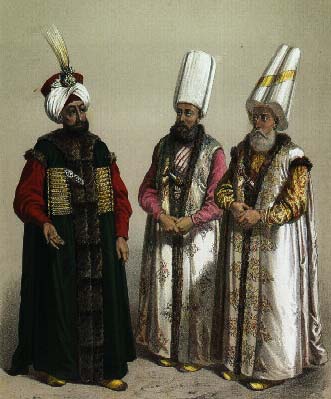Dubrovnik and The Ottoman Empire
The Ottomans Arrive:
 From the 14th century onwards, the Ottoman armies penetrated the different European states. After the fall of Constantinople in 1453, the Republic understood that their days were numbered if they didn’t establish good relations with the Ottoman Empire. By 1465, Ottoman armies had taken Bosnia and Herzegovina, only a short ride away from Dubrovnik. Ragusa decided on a policy of neutrality, positioning itself both a protégé of the Pope and a vassal to the sultan. This allowed its ships and traders to continue to work in a precarious environment.
From the 14th century onwards, the Ottoman armies penetrated the different European states. After the fall of Constantinople in 1453, the Republic understood that their days were numbered if they didn’t establish good relations with the Ottoman Empire. By 1465, Ottoman armies had taken Bosnia and Herzegovina, only a short ride away from Dubrovnik. Ragusa decided on a policy of neutrality, positioning itself both a protégé of the Pope and a vassal to the sultan. This allowed its ships and traders to continue to work in a precarious environment.
A map of Dubrovnik in the 15th century showing its confetti of territory precariously balancing on the borderland of East and West, Christianity and Islam, Slav and Latin
By 1500, Dubrovnik had well-established relations with the Ottoman Empire. Through a tribute agreement known as the capitulations, the Republic guaranteed itself security, autonomy and prosperity. The annual tribute and its terms increased and varied over the years up to some 12,500 golden ducats. The peace and prosperity that this agreement gave allowed the Ragusan republic to continue its trade with both east and West.
However, the sometimes chaotic nature of the Ottoman Empire meant that the tribute paid did not have the expected effect in all the Ottoman provinces, including the nearest one to Dubrovnik, Bosnia. The habit of being in a precarious position meant that the city state had to cultivate relations with other levels of Ottoman administration in order to allow commerce to proceed, secure the continued protection of the sultan and secure the peace and prosperity necessary for the state’s survival.
This was achieved through significant efforts in a survival strategy that included bribes, gifts and services ranging from intelligence information from other European countries to medical care. Along with its diplomats, an important role was carried out by the dragomans, Orientalist experts and interpreters of the Turkish language. It was the dragomans who were instrumental in establishing successful networks between East and West.
The dragoman was a civil servant who received comprehensive training as an interpreter, diplomat and interlocutor from the Republic of Ragusa. They would spend many years being educated for the role, learning Turkish, Arabic and Persian and carrying out compulsory study placements abroad to various Balkan regions and Istanbul. The dragoman’s role was to maintain regular contact with the Ottoman authorities in the borderland region. It was with the border with Bosnia where trade would often be halted by a whim of an Ottoman official that dragomans would have to sort out the problem and keep the trade route alive. This was carried out through offering gifts and a smooth tongued and able dragoman.
The experience of the dragomans and Dubrovnik’s unique position between East and West meant that other European states would frequently recruit their services. With their international experience and fluency in numerous languages, dragomans used their skills in the services of other significant European powers such as the Austrian empire, the Spanish empire, Venice, France and Prussia. One of them, Damjan Bračević would become one of the interpreters of General Bonaparte during his campaign in Egypt.
Despite their unique capabilities, dragomans were suspected of being too acclimatised to the Ottoman way of life and manners. A contemporary satirical poem that circulated in the Mediterranean at the time: “A Pera ci sono tre malanni: peste, fuoco e dragomanni” (In Pera we have three miseries: pestilence, fire, and dragomans). (Vicko Marelic)
Need Entry Tickets to Town Walls? Buy Now
Dubrovnik History Articles
- The History of Dubrovnik – an introduction
- The foundation in the Dark Ages – balancing on a borderland
- Early medieval times
- The beginning of trade
- Trade Agreements with Balkan Countries
- Breaking Away From Venice and Territorial Expansion
- The Ottomans Arrive
- Dubrovnik’s Golden Age
- Dubrovnik as the Focal Point of Dalmatian Enlightment
- Rudjer Boskovic – Dubrovnik’s Shining Example of the Enlightement
- The Jews of Dubrovnik

 Subscribe
Subscribe